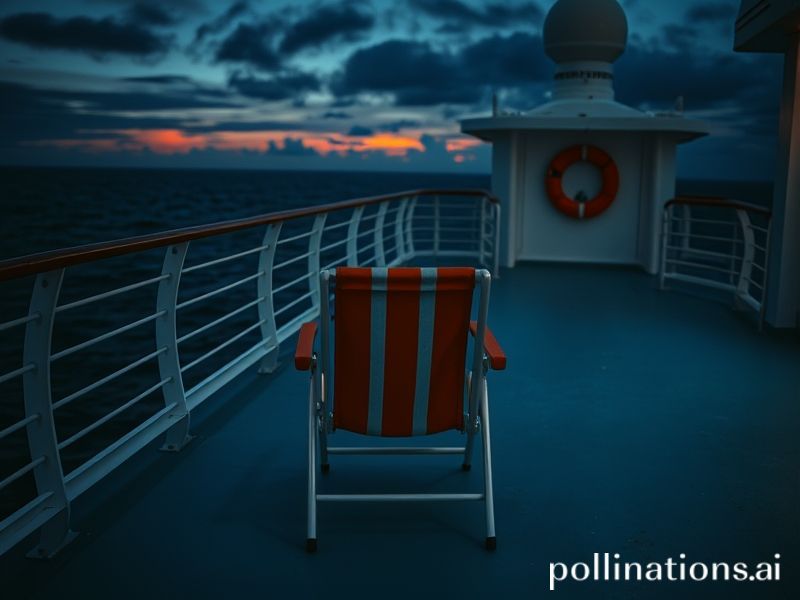Overboard Again: How One Missing Cruise Passenger Mirrors a World Adrift
Another Day, Another Deck Chair: The Vanishing Passenger Who Reminds Us We’re All Just Tourists on a Sinking Planet
Dave’s Locker, International Desk – 03:46 UTC
Somewhere between Cozumel and the existential void, Carnival Cruise Line’s newest headliner slipped overboard. The passenger—identity withheld pending awkward family group-chat diplomacy—was last seen at the 24-hour soft-serve machine, which, in fairness, is where most people decide whether life is still worth the calories. By the time the ship’s PA system coughed up the multilingual “Code Oscar,” the Indian Ocean had already swallowed a thousand plastic straws and one more human story.
The incident is being investigated by a multinational task force composed of Panamanian registry officials, Bahamian maritime police, and a lone U.S. Coast Guard lieutenant whose Zoom background is visibly seasick. Interpol has issued a Yellow Notice, the bureaucratic equivalent of shrugging in seventeen languages. Meanwhile, TikTok sleuths—armed with pixelated deck maps and a thesaurus of crying emojis—have identified at least seven “persons of interest,” including the ship’s hypnotist and a towel-folding flamingo.
Global Implications, or How to Lose a Passenger in 195 Territorial Waters
At first glance, a single missing cruiser is hardly newsworthy; statistically, you’re likelier to be bitten by a shark while Googling “shark bite statistics.” Yet the disappearance is a Rorschach test for our planetary neuroses. For Europeans, it confirms their suspicion that American portion sizes have finally achieved lethal mass. For Americans, it’s evidence that the world is a lawless waterpark where the fries are bottomless but the guardrails negotiable. For Australians, it’s Tuesday.
Cruise lines, those floating petri dishes of late-capitalist aspiration, are registered in tax havens faster than you can say “environmental restitution.” When something goes sideways, jurisdiction frays like a souvenir beach towel. The vessel in question sails under Panama’s flag, is staffed by Filipinos, owned by a Miami conglomerate, and currently drifting through waters claimed by everyone except, notably, the passenger who vanished. If international law were a dinner buffet, this would be the sneeze guard: transparent, greasy, and nobody’s really sure who last wiped it down.
A Brief History of Humans Misplacing Themselves at Sea
The cruise industry, valued at $25 billion and rising faster than sea levels, loses roughly one passenger a fortnight—somewhere between “statistical rounding error” and “acceptable churn.” Before floating cities, people simply walked into forests or joined monasteries; now they pay $1,299 (drinks package extra) to contemplate infinity beside a urine-warm hot tub.
In 2012, a Korean wave washed a honeymooner off a Royal Caribbean balcony; in 2019, a British IT consultant vanished from a Mediterranean disco at 3 a.m., presumably after realizing the DJ’s playlist was the same BPM as his resting heart rate. Each incident triggers the same kabuki: tearful press conferences, CCTV footage grainier than Soviet television, and a GoFundMe that underwrites the bereaved’s next vacation.
The Broader Significance, Because Editors Insist
Climate change means more Category-5 tantrums, which means more rerouted itineraries, which means more passengers discovering that “force majeure” is Latin for “no refunds.” The pandemic taught us that ships are excellent incubators—of viruses, of lawsuits, of existential dread. And now, as insurers quietly raise premiums faster than the tide, investors are eyeing the lifeboats: the first cruise line to pivot into offshore data centers will probably be hailed as visionary, even if the servers occasionally hum whale songs.
Conclusion: The Ocean Wins Again
By the time this dispatch reaches your screen, the search will have scaled down to “recovery,” a semantic slide from hope to paperwork. Somewhere, a manifest will be quietly amended, a loyalty point balance zeroed out. And another ship—bigger, brighter, with better Wi-Fi—will depart Port Canaveral promising “adventure,” a word that once meant crossing oceans but now means paying $14 for a margarita in international waters.
The missing passenger remains, for now, a free variable in humanity’s least suspenseful equation. The rest of us sail on, clutching souvenir cups like talismans against the deep. Bon voyage, dear reader. Try not to lean too far over the railing; the planet’s already doing that for us.







